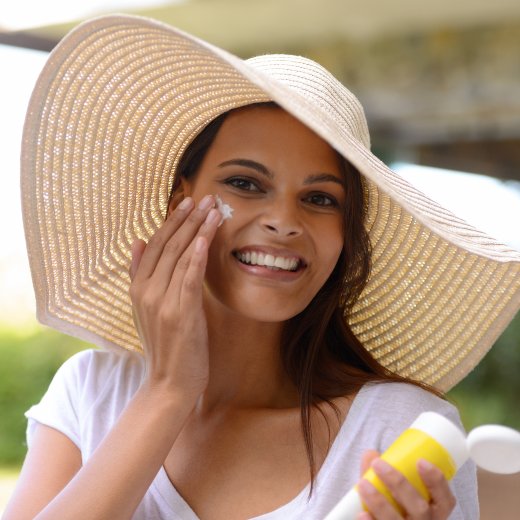As a beauty enthusiast, you know how crucial is the role of sunscreen in the skincare routine. It is so vital that some countries have strengthened their efforts of communicating to the public the important measures that people should take to protect themselves from the harmful rays of the sun, particularly the evidence-based recommendation of sunscreen application.1
With continuous exposure to UV radiation, the skin becomes vulnerable to a lot of skin issues – from skin aging to wrinkles, laxity, elastosis, pigmentation, sunburn, and even cancer.2 But trips and weekends are never complete without having fun under the sun. That’s why it is important to cater to your consumers’ needs with high-quality private label sunscreen.
So, How Does Sunscreen Work?
Applying sunscreen before sun exposure and reapplying it once within one-hour 3 allows the skin to stay protected under the heat of the sun. Sunscreen blocks and absorbs the UV rays through its physical (zinc oxide and titanium dioxide) and chemical particles and release energy through the form of heat.4
How to Choose the Best Private Label Sunscreen?
Now that we’ve established the importance of sunscreen in the skincare routine, the next question you might be having is: how to choose the best sunscreen? While they may have the same purpose – of protecting your skin from harmful damages – we all know that not all sunscreen products that you see in the market are created equal.
So, how to choose the best sunscreen?
Take note of the SPF.
During product development or when purchasing wholesale sunscreen, you have to make sure that your sunscreen has a sun protection factor (SPF) 30 – or higher. It is highly recommended by the American Academy of Dermatology to always choose a sunscreen with higher SPF for better protection against UV radiation.5
Check for broad-spectrum protection.
Aside from SPF, you also need to make sure that the sunscreen that you are providing to your customers can protect them against UVA and UVB rays. While sunscreen products are made to protect the skin from UVB rays which usually causes sunburn, not all sunscreen products can protect the skin from UVA rays which contributes to skin cancer and accelerates skin aging.6 Simply put, sunscreen products that are not labeled as broad-spectrum are only capable of protecting the skin against sunburn and not skin cancer or skin aging.
Make sure it’s water-resistant.
With the kind of activities that can be done under the sun – be it swimming or any active engagement that causes one to sweat – the American Academy of Dermatology suggests that sunscreen products must be reapplied either 40 to 80 minutes after the first application. This is to get the best results because sunscreen products can be rubbed off with a towel or any other sweat absorbent material. Hence, the need to put reapply from time to time.
Choose organic sunscreen.
The safest way to protect your skin – not only from the heat of the sun but also from toxic chemicals – is to choose natural skin care products, such as organic sunscreen. Made from organic ingredients like aloe vera juice, shea butter, citrus fiber, lavender essential oil, and vitamin E, the organic sunscreen produced by conscious manufacturing companies like The Omnium Group contains no harmful chemicals and is great for all skin types – and better for the environment too!
Whether you’re on an e-commerce business, spa, or still planning to start your skincare line, you can count on The Omnium Group for your private label sunscreen needs. Talk to our expertly trained associate and start protecting the skin of your customers with private label sunscreen.
As a full-service, contract manufacturing, and private label company, we, at The Omnium Group, are capable of providing a high-quality private label, co-packing, and bulk supply services to established and startup beauty brands. We offer our clients custom formulation and product development services to help you realize your vision of providing the best sunscreen and skincare products to your customers. Contact us now!
References:
1 Li H, Colantonio S, Dawson A, Lin X, Beecker J. Sunscreen Application, Safety, and Sun Protection: The Evidence. J Cutan Med Surg. 2019 Jul/Aug;23(4):357-369. doi: 10.1177/1203475419856611. Epub 2019 Jun 20. PMID: 31219707.
2 Gu Y, Han J, Jiang C, Zhang Y. Biomarkers, oxidative stress and autophagy in skin aging. Ageing Res Rev. 2020 May;59:101036. doi: 10.1016/j.arr.2020.101036. Epub 2020 Feb 24. PMID: 32105850.
3 Petersen B, Wulf HC. Application of sunscreen–theory and reality. Photodermatol Photoimmunol Photomed. 2014 Apr-Jun;30(2-3):96-101. doi: 10.1111/phpp.12099. Epub 2014 Jan 6. PMID: 24313722.
4 Gabros S, Nessel TA, Zito PM. Sunscreens And Photoprotection. 2021 Nov 15. In: StatPearls [Internet]. Treasure Island (FL): StatPearls Publishing; 2022 Jan–. PMID: 30725849.
5 https://www.aad.org/public/everyday-care/sun-protection/sunscreen/how-to-select-sunscreen
6 de Gruijl FR. Photocarcinogenesis: UVA vs UVB. Methods Enzymol. 2000;319:359-66. doi: 10.1016/s0076-6879(00)19035-4. PMID: 10907526.
